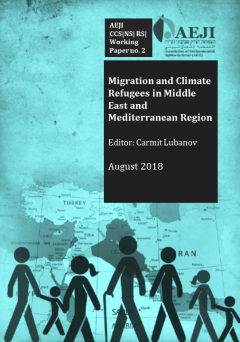
This working-paper is part of Association of Environmental Justice in Israel (AEJI) policy-research on climate change in regional scale, aims to develop discourse on climate migration on public arena, and to provide analysis as a base for policy making assessments of "Climate Change and Security“ in Israel and the Middle East in order that social and human rights considerations will be integral part of policy making process on national, regional and international levels.
The multi-linkages that are between climate change and national security, and between cross-borders environment and human rights are all analyzed and discussed vis-à-vis the current geopolitical landscape and associated transboundary challenges in the East Mediterranean region.
The 1st report titled “Mitigation of Climate Risk and Adaptation to Climate Security in Israel and the Middle East: Policy Measures toward Geopolitical Cooperation and Regional Transformation” [researcher Joel Gordon, supervisor Carmit Lubanov], was published last year framing the full spectrum of actual climate security threats and challenges. The study employs the Intergovernmental Panel on Climate Change (IPCC) framework of "Climate Mitigation and Adaptation" to assess prospects for climate-security in the region. The paper is based on preliminary findings correlate Israel’s potential role in climate-security politics to positive economic benefits. To our view, Climate Change Leadership (CCL) offers an alternative pathway for regional cooperation and geopolitical stability through the advance of Middle Eastern-Mediterranean Alliances (MEMA’s). Furthermore, we propose this vision aligns to a core strategic national masterplan - Leveraging for Geopolitical Cooperation and Regional Transformation – designed to strengthen Israel’s national commitment towards a Climate Compatible Future (CCF). In order to achieve this future, Israel with the neighboring countries and the Mediterranean climate community must to focusing on migratory pressures and climate refugees, to advance geopolitical cooperation and regional transformation in order to be able to challenges the Climate Migration.
The working-paper raises the key topics in five sections. The full research of AEJI on migration and climate refugees in the Middle East and Eastern Mediterranean region will be published in the coming year.

